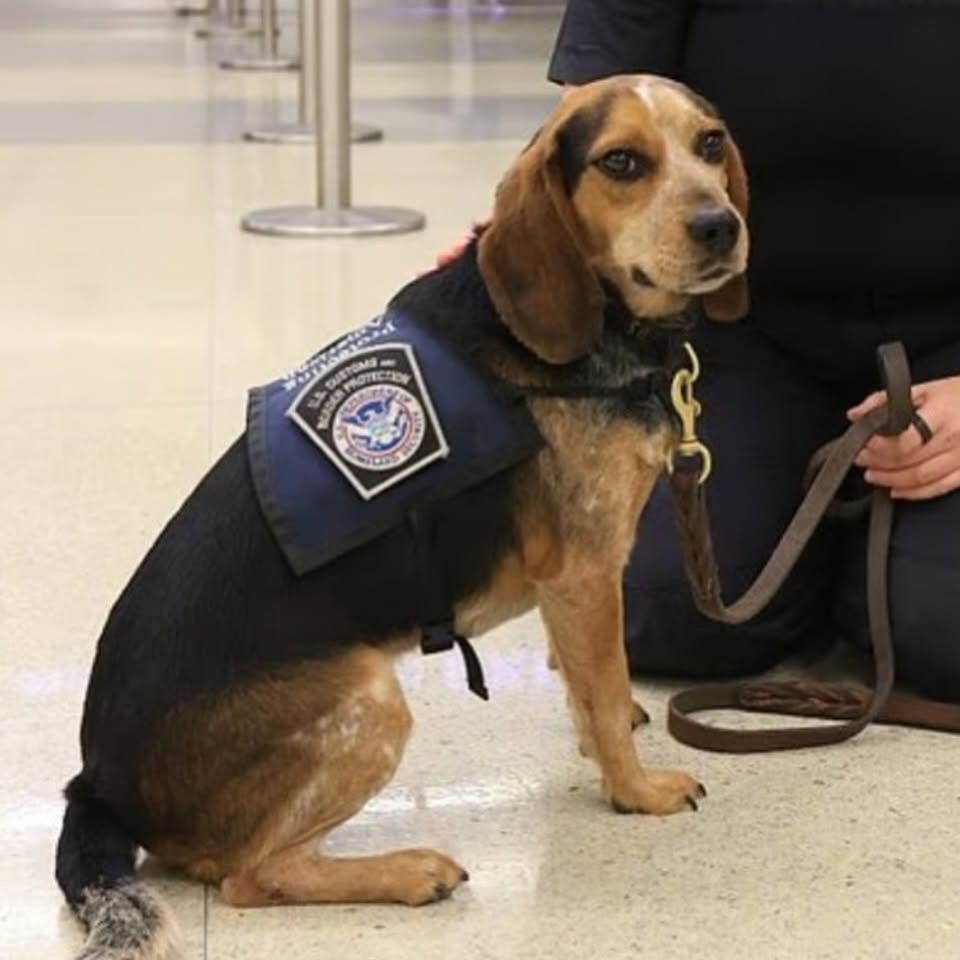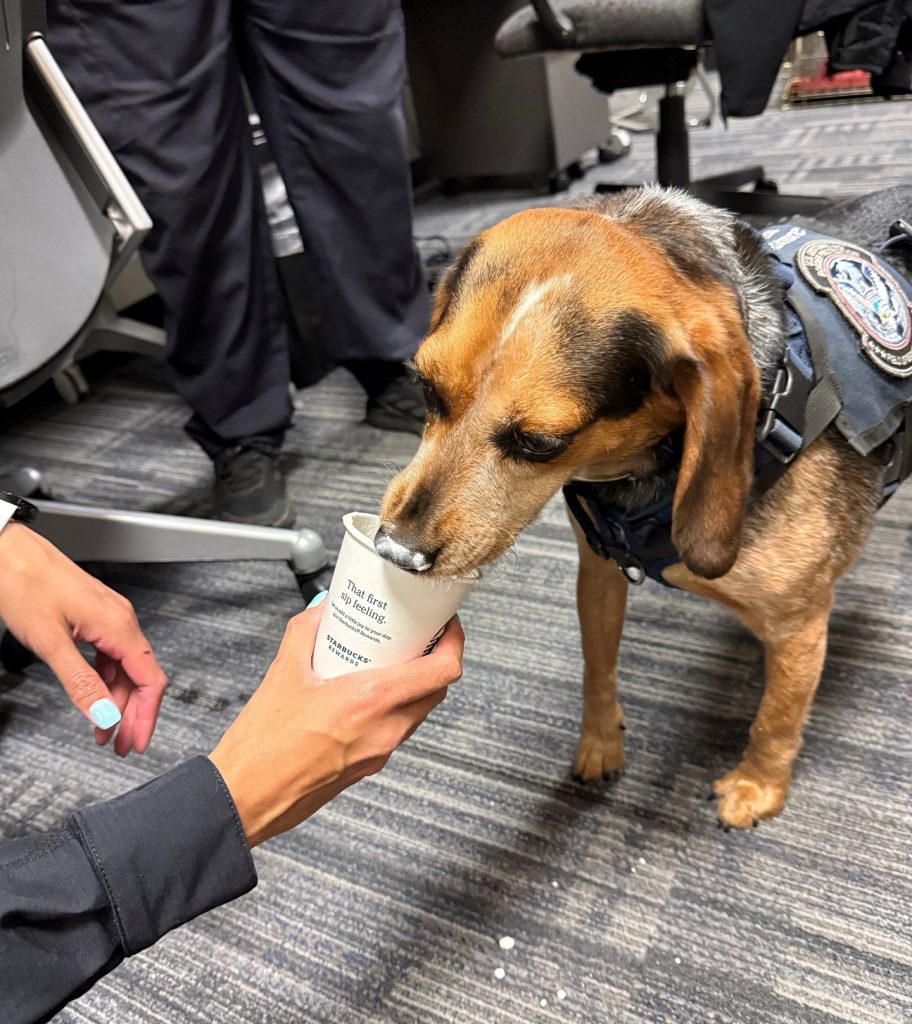70‑Year‑Old Egyptian Arrested After Kicking Freddie the Beagle—He Tried Smuggling 100+ lbs of Food Through Dulles Airport!
It was an ordinary morning at Washington Dulles International Airport, with travelers weaving through baggage claim and the gentle hum of rolling wheels. Among them was Freddie, a five-year-old beagle with a job far more important than looking cute. Hunched over a suitcase, ears perked, tail alert—Freddie was a part of the elite CBP “Beagle Brigade,” trained to sniff out food that shouldn’t cross U.S. borders. When Freddie alerted on one traveler’s beaten-up suitcase, no one could’ve guessed how tense the scene would get.
That traveler was a 70-year-old man from Egypt named Hamed Ramadan Bayoumy Aly Marie. He’d arrived on a flight from Cairo, wheeling two heavy bags. Freddie’s nose acted faster than anyone: he worked his way around Marie’s bag, signaling for his handler. What followed was a moment that stunned everyone nearby. Instead of cooperating, Marie lashed out. He violently kicked Freddie so hard the little beagle—a mere 25 pounds—flew off the ground. Witnesses say the airport froze for a second. The handler and CBP officers rushed in. The shock in their eyes was real.
Freddie, trembling but brave, lay on the floor for a moment before being gently picked up and taken to veterinary care. He had bruises on his right front rib—a painful reminder that sometimes heroes get hurt on the job. CBP spokesman Stephen Sapp later shared that Freddie was prescribed rest and light pain medication. Even so, he was back on duty in less than a week, celebrated with a well-earned Pup Cup from Starbucks. It wasn’t just a happy ending—it was proof that Freddie’s spirit wasn’t broken.

A Costly Mistake and a Lesson in Respect
Once the dust settled, customs officers inspected Marie’s luggage. What they found was astonishing—more than 100 pounds of undeclared food products. There were 55 pounds of beef, 44 pounds of rice, 15 pounds of vegetables like eggplant, cucumbers and bell peppers, plus corn seeds and herbs. All that food was packed loose, with no U.S. import permits, and standard agricultural rules strictly prohibit it. These rules exist to prevent harmful pests, diseases or contaminants that could devastate crops and livestock here.
CBP’s Area Port Director for Washington, Christine Waugh, addressed the situation in strong terms: “Being caught deliberately smuggling well over one hundred pounds of undeclared and prohibited agriculture products does not give one permission to violently assault a defenseless Customs and Border Protection beagle.” Her words reflected the emotion felt by everyone who works with these dogs—they’re more than trained animals; they’re partners.

Marie was arrested and charged under federal law 18 U.S.C. 1368 for harming animals used in law enforcement. He pled guilty during his first court appearance. He was credited for time served in custody, ordered to pay $840 for Freddie’s vet bills, and deported the next day, back to Egypt. That was the swift justice CBP promised.
This incident stands out because it highlights two lessons. One: don’t ignore customs rules. Meat, rice, seeds, vegetables—if you don’t have proper clearance, it stays home. Two: hurting a working animal isn’t just morally wrong—it’s illegal. Doing so guarantees serious consequences, including jail time, fines, deportation, and a ban from re-entry.
It’s easy to spot viral social media moments when a dog is involved. Weeks later, CBP’s official X (formerly Twitter) account posted a photo of Freddie enjoying a Pup Cup with a caption thanking everyone for their concern. Comments flooded in: “Poor doggo ❤️” or “He was just doing his job. No excuse to hurt him.” Support poured in from all corners. Some asked if punishments should be even tougher. Others focused on Freddie’s glowing recovery, celebrating CBP’s quick response.
Freddie’s story reminds us of the Beagle Brigade’s real impact. These dogs and their human partners screen thousands of passengers every day. Last year alone, CBP said their teams intercepted nearly 3,600 prohibited plant and animal products—plus 247 insect pests—across U.S. entry points every day. Without them, agricultural diseases could easily sneak in, threatening crops, livestock, and even local economies.

Picture it: a single smuggled pest crawling into exported goods, then spreading through a state or even country. What starts as a small bug could cost billions. That’s why CBP invests in painstaking training for these dogs. And why they deserve respect—not violence.
Think back to the image of Freddie’s face. Eyes wide, nose damp, stuck in that moment between work and fear when he was kicked. It’s an emotional snapshot: a brave working dog, the epitome of innocence, attacked for doing his job. Yet less than a week later, he’s back at work, tail wagging, ready to sniff luggage again. That’s the resilience built by love, training, and teamwork between handlers and dogs.
That’s also the deeper story here—not just that a man got deported for kicking a dog. It’s that Freddie and his kind carry heavy responsibility. Their noses guard health, crops, and borders. Their work isn’t glamorous. It’s often overlooked. But it’s essential. When people cross borders, these dogs do too—into baggage, into crowds, into the unknown.
For travelers, the takeaway is clear: obey customs rules. Declare food items, even if they seem harmless. And remember that behind every detection dog is someone—a handler, a trainer, a veterinary team—invested in that animal’s well-being.
Freddie’s return to duty wasn’t just routine. It was a statement that kindness and respect matter. That tough laws exist to protect animal workers. And that sometimes, the smallest heroes teach the biggest lessons.
Freddie’s story spread across news sites—Washington Post, Fox News, WTOP, Newsweek—and across social platforms. But in the end, the real narrative is simple: a dedicated animal doing his job, a traveler making a desperate mistake, and laws stepping in to set things right. There’s a powerful emotional core here—bravery, justice, recovery, respect—and that’s what makes this story stick.
So next time you’re inching through baggage claim, and a small official dog sniffs your suitcase, give a nod of thanks. That beagle might just save crops, families, and communities—all by doing what comes naturally. Freddie did his job, got hurt, recovered—and made sure a rule-breaker faced the consequences. In the world of border protection, that’s a story worth telling.

Daniel Reed is a curious mind with a passion for breaking down how the world works. With a background in mechanical engineering and digital media, he turns complex ideas into easy-to-understand articles that entertain and inform. From vintage tools and modern tech to viral internet debates and life hacks, Daniel is always on the hunt for the “why” behind the everyday. His goal is simple: make learning feel like scrolling through your favorite feed — addictive, surprising, and fun.
